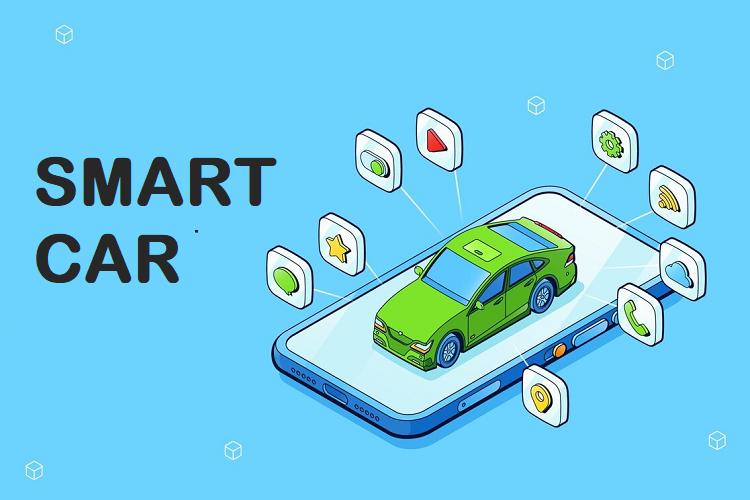Welcome to the fast lane of the automotive future, where your car isn’t just a means of transport but a data hub on wheels. Smart cars, equipped with cutting-edge technology, promise a connected and convenient driving experience. However, as we embrace this tech-savvy revolution, it’s crucial to tap the brakes and examine the privacy concerns revving up alongside these sleek, intelligent vehicles.

The Data Goldmine
Picture this: Your smart car knows you so well it’s practically a mind reader. Research on smart cars has shown that from your favorite driving routes to your preferred temperature setting, these vehicles are not just transporting you; they’re collecting a treasure trove of personal data.
According to recent studies, smart cars store an astonishing amount of information, ranging from your entertainment choices to the places you frequent. This data isn’t just for enhancing your driving experience; it’s a valuable commodity that could be shared with third parties. Imagine a stranger knowing more about your daily routine than you do. That’s the data-driven dilemma we face.
Smart cars are essentially rolling data centers, constantly collecting and transmitting information to enhance our driving experience. However, this connectivity also opens a Pandora’s box of security vulnerabilities. Recent findings in cybersecurity paint a concerning picture – the number of data breaches in smart cars has surged by a staggering 67% in the past year alone.
Imagine a scenario where a hacker gains unauthorized access to your car’s system, potentially manipulating critical functions like braking or steering. It’s not just a hypothetical situation; it’s a real and growing threat.
Invisible Intruders
The primary culprit behind these data breaches is often the interconnected nature of smart cars. As these vehicles communicate with each other and external networks, they become attractive targets for hackers seeking to exploit vulnerabilities.
A recent study revealed that over 80% of smart car owners are unaware of the potential risks associated with the extensive data collection these vehicles perform. It’s not just personal data at stake; it’s the safety and security of everyone on the road. Manufacturers must prioritize robust cybersecurity measures to safeguard not only our privacy but also the physical well-being of smart car users.
Closing the Digital Doors
With the new ban on diesel and petrol cars worldwide and more people turning to eco-friendly and smart cars, we revel in their conveniences, making it essential to address the growing threat of data breaches in smart cars proactively. Manufacturers must invest in state-of-the-art cybersecurity protocols to fortify their vehicles against potential attacks.
Additionally, users can play a crucial role in protecting themselves by adopting good cybersecurity practices. Regularly updating in-car software and using strong and unique passwords can significantly reduce the risk of data breaches.
Hitchhiking with Hackers
As we explore the era of smart cars even more, the digital highway becomes a potential breeding ground for cyber threats. The more connected our vehicles are, the more susceptible they become to hackers. Imagine the nightmare of a malicious actor taking control of your car remotely.
It’s not just a sci-fi plot; it’s a genuine concern. Recent cybersecurity reports indicate a surge in car-related cyber incidents. The question isn’t whether hackers are interested in your smart car; it’s how we can fortify our vehicles against these potential attacks.
Beyond the allure of cutting-edge technology, these vehicles offer a suite of benefits that align seamlessly with a tech-savvy lifestyle. Imagine the convenience of starting your car remotely, receiving real-time traffic updates, or adjusting your vehicle’s settings with a simple app. Smart cars transcend traditional transportation; they become an integral part of your connected life.
Picture your car knowing your daily routine, preferred destinations, and music playlist. However, in the wrong hands, this wealth of data can be exploited, compromising your privacy and security. As a responsible driver in the digital age, it’s vital to be mindful of the information you share and with whom. The symbiotic relationship between smart cars and drivers demands a conscious effort to balance technological convenience with the preservation of personal data.
Regulatory Crossroads
In the world of smart cars, technology is advancing at breakneck speed, but regulations need help to keep up. The current landscape is akin to navigating uncharted territory without a map. There needs to be more precise guidelines on how manufacturers should handle the vast amounts of data these vehicles collect. The absence of stringent regulations leaves consumers vulnerable to potential privacy violations.
As we accelerate into this uncharted future, we must advocate for robust rules that protect our digital rights. Much like using a VPN to safeguard your online activities, demanding transparency and accountability from smart car manufacturers is critical to ensuring a secure and private driving experience for everyone on the road.
Data breaches in smart cars are not just a threat to our digital privacy but to our physical safety. Both manufacturers and users must be vigilant, implementing robust security measures to ensure that our connected cars remain a source of convenience rather than a conduit for chaos.
Conclusion
The smart car revolution is thrilling, but it comes with challenges, especially concerning privacy. As consumers, it’s our responsibility to stay informed, demand transparency, and take proactive measures to secure our digital journey on the road ahead. The comfort of your smart car envelopes you, but remember, every GPS ping, voice command, and sensor input leaves a digital footprint.
Ensuring a safe and secure driving experience in the digital age involves adopting certain precautions. Regularly updating your car’s software becomes a digital shield against potential vulnerabilities. Crafting strong and unique passwords for in-car apps adds an extra layer of protection, and exercising caution with third-party apps requesting access to your vehicle data is paramount.
Achieving a delicate balance between convenience and cybersecurity requires a vigilant approach. Let’s explore the future with our eyes wide open and our privacy intact. The end of smart cars is bright, but we must steer it in the right direction.



